What is a share certificate?
A share certificate is a legal certificate stating that the holder of the share has a certain percentage of ownership of a business. When a business wants to raise capital, it has two options – either issue share certificates or take a loan. Both of these options have their merits and demerits.
Often businesses opt to raise money by selling shares to investors. The buyers of these shares then have a share in the business and become one of the key stakeholders. However, not everyone who buys a share has control over the business.
A shareholder only has a controlling interest if they own more than 50% of a company’s share certificates. Some share certificates earn periodic dividends for their shareholders.
A share certificate is commonly known as a stock certificate. There are several different types of shares that a business can issue such as ordinary shares, preference shares, non-voting shares, and redeemable shares.
Ordinary shares: These shares are the most common type of shares issued by companies. Ordinary shares each carry one vote per share and owners receive a dividend if and when announced by the company board of directors. Upon dissolution of the company, ordinary shareholders receive equal proceeds from the sale. Dividends for ordinary shares are not fixed, nor do companies pay out dividends every year. It is at the discretion of the company’s board of directors
Preference shares: These types of shares are entitled to fixed dividends and are given priority over ordinary shares. Preference shareholders are paid dividends before ordinary shareholders. Moreover, in the case of dissolution or bankruptcy, preference shares have the first claim to proceeds from company assets.
Non-voting shares: These shares are similar to ordinary shares in aspects of dividend payments and claims to repayment in case of bankruptcy. However, what sets these shares apart is that the shareholders holding non-voting shares do not have the right to vote in Annual General Meetings.
Redeemable shares: These are shares that a company often issues to shareholders to buy back in the future. The time to redeem these shares can be fixed or at the director’s discretion. The redemption price is usually the same as the original price, but it could differ as well. Companies often issue redeemable preference shares.
If you are interested in making financial investments, investing in shares is a good option. To receive dividends or trade shares, you must have a business share certificate. Usually, not everyone can buy shares and therefore, you might need to hire a stock exchange agent to buy and sell for you.
Benefits of having a business share certificate
Having a business share certificate has several advantages. Firstly, business share certificates are an asset. If you have invested smartly in a growing company, then you can expect this asset to be appreciated. Moreover, when a company announces dividends, the owners of that company’s share certificates can expect to receive income from the shares.
Many people make good profits through buying and selling share certificates. The price of a share is different from its face value. When the price is higher than the face value, selling the share certificate can result in profit. Investing in a stable company can thus become a profitable investment.
Who can issue a share certificate?
Not every company can issue share certificates whenever it requires funds. To issue shares, a company must first conform to some legal rules. These include having a registered company name, a minimum of one director, and one shareholder. Furthermore, the company must draft out a Memorandum of Association – which is the agreement between all initial stakeholders; a statement of capital outlining the types and class of shares to be issued complete with rights; and finally an Article of Association – which outlines rules about how a company is run.
In addition, when a company has been granted permission to issue share certificates, the company also needs to carry out certain tasks such as creating a Board of Directors, holding an Annual General Meeting, and publishing Annual Financial Reports for their stakeholders.
What is the worth of a share certificate?
Share certificates have a certain face value – usually $1. The face value of a share certificate is fixed. However, the value of the share itself may vary.
The worth of a share certificate depends on a company’s performance, the economic situation of the country it is operating, political factors, and future forecasts relevant to the company.
Usually, a company operating in a stable environment, showing persistent growth, and making profits have a higher share price. Alternatively, a company about to go bankrupt may have a value less than its face value.
Thus the worth of a share certificate may be higher or lower than the face value depending on the company’s performance.
#1
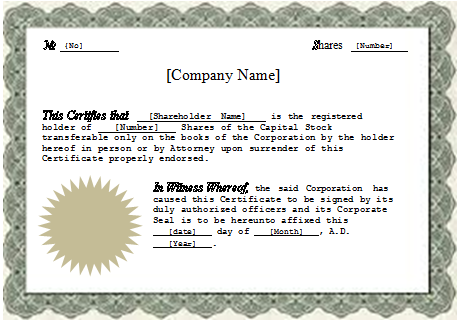
MS Word [.docx]
#2
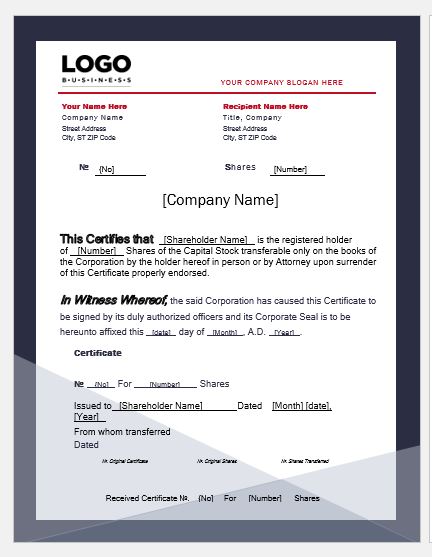
MS Word [.docx]
#3
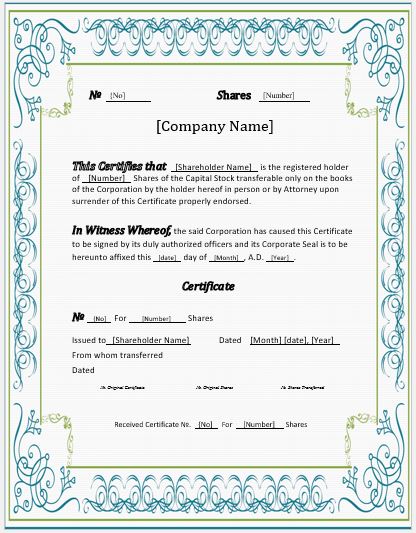
MS Word [.docx]
#4
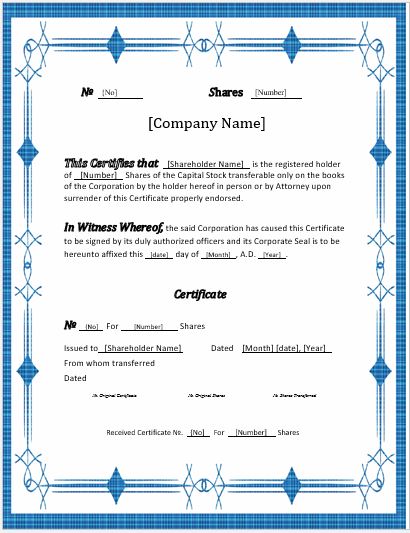
MS Word [.docx]
#5
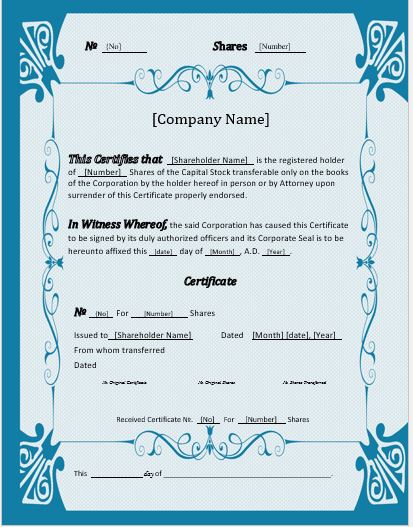
MS Word [.docx]
#6
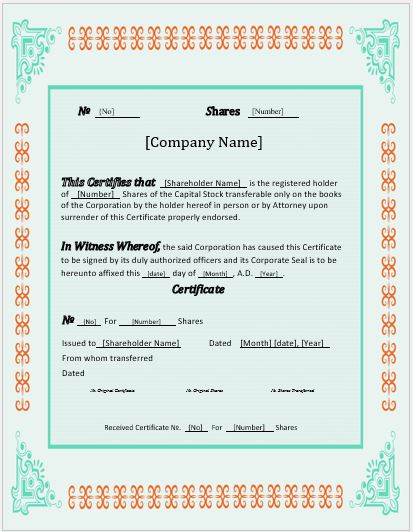
MS Word [.docx]
#7
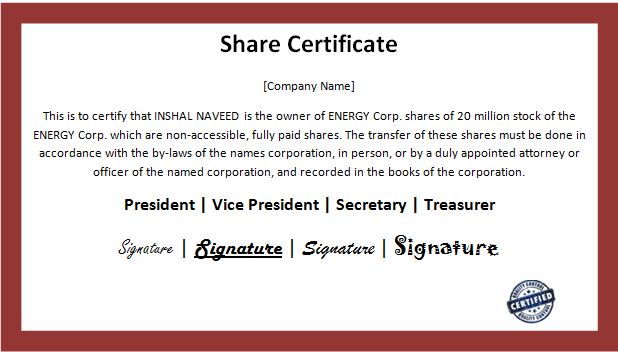
MS Word [.docx]
- Quarterly Tax Payment Tracker
- Payroll Tracker for Excel
- Delivery Route Optimization Worksheet
- Energy Consumption Monitoring Worksheet
- Return on Investment (ROI) Calculator
- Investment Portfolio Tracker
- Equipment Utilization Worksheet
- Emissions Monitoring Worksheet
- Monthly Utility Consumption Worksheet
- Sales Tax Calculation Sheet
- Fixed Asset Register Template
- Advance Salary Tracker
- Benefits and Deductions Worksheet
- Capital Expenditure Tracker Template
- Departmental Budget Allocation Sheet
- Payment Reminder Schedule
- Customer Payment Log
- Value Added Tax (VAT) Log